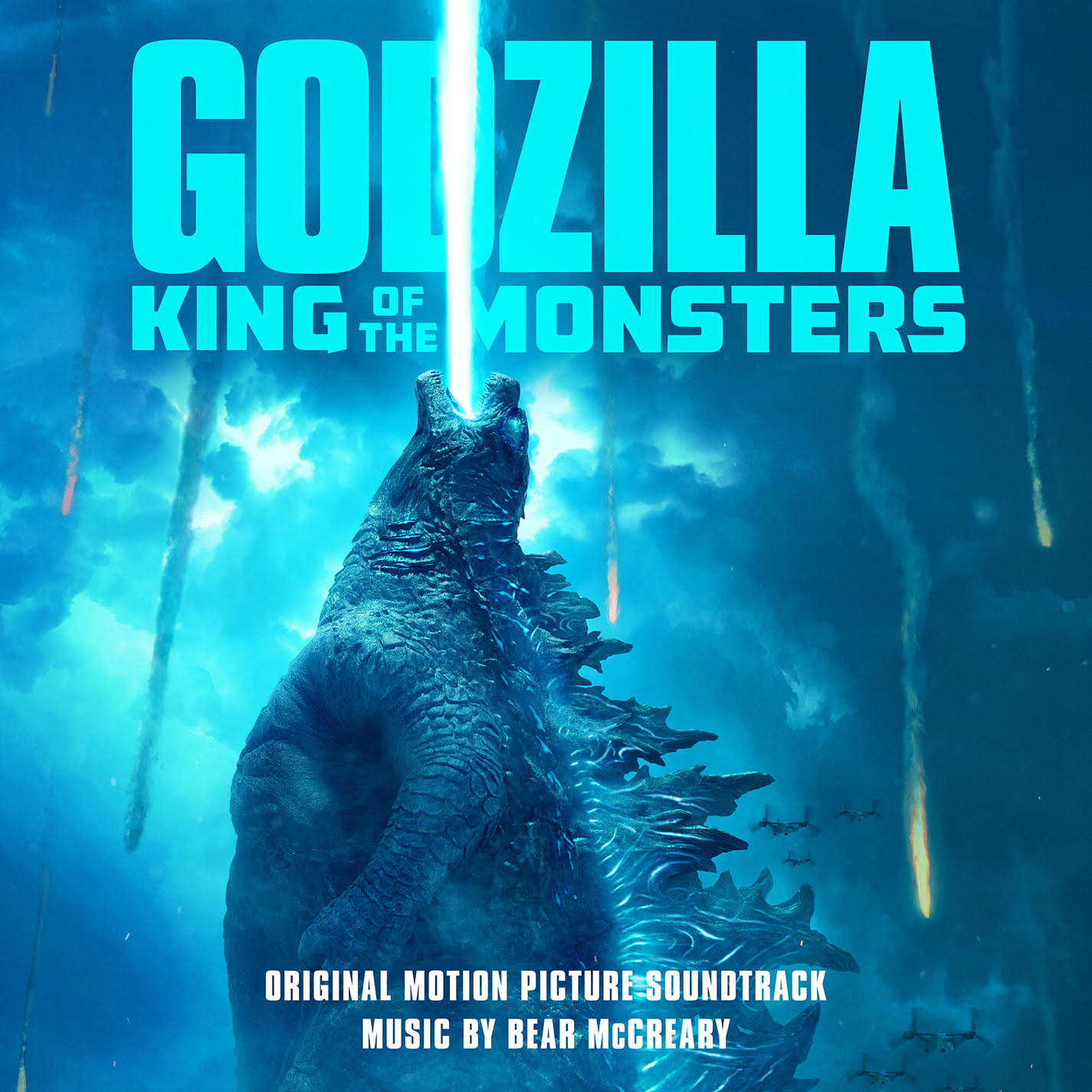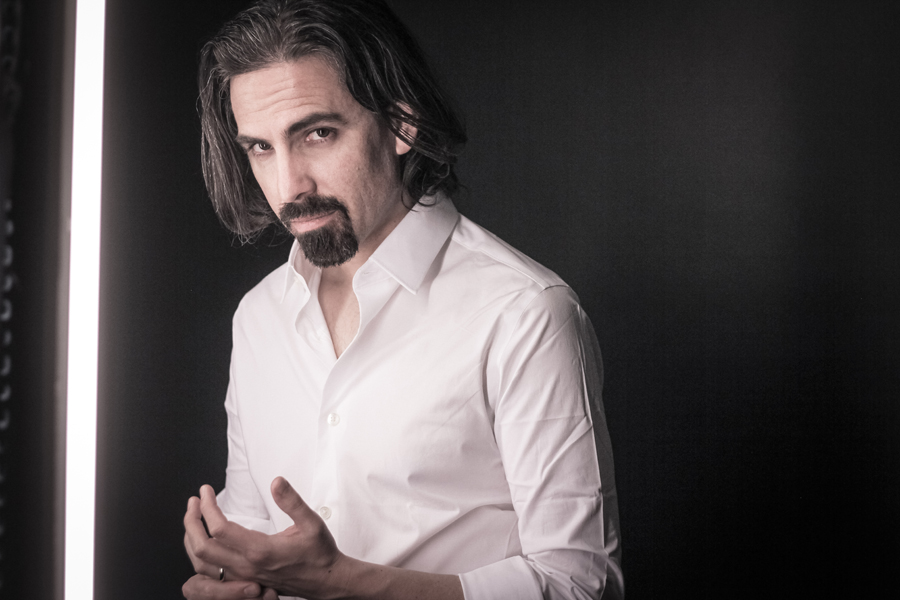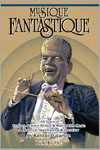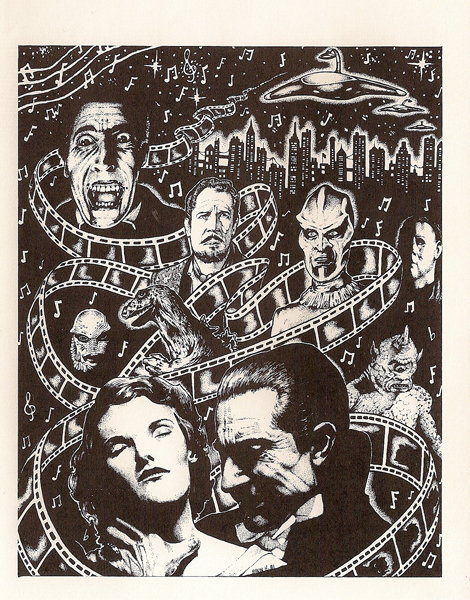May 27, 2019
Bear McCreary: Scoring GODZILLA KING OF THE MONSTERS
Interview by Randall D. Larson
“I did not want this to be a retro score. I wanted it very much to be what I think a blockbuster score should sound like in 2019. It just so happens that some of the thematic material for our most important characters has a legacy that comes from the past.”
 Q: It’s interesting that you scored COLOSSAL which in a way is a kind of progenitor of Godzilla in kaiju terms. What effect did this have on your getting GODZILLA or beginning to think musically in a kaiju kind of expression?
Q: It’s interesting that you scored COLOSSAL which in a way is a kind of progenitor of Godzilla in kaiju terms. What effect did this have on your getting GODZILLA or beginning to think musically in a kaiju kind of expression?
Bear McCreary: That’s a great question. The funny thing is, I thought COLOSSAL would be my only chance to score a kaiju film! So in that film – which I’m not going to spoil, I highly recommend people go check it out – deals with the kaiju element in a very interesting way. That element, in terms of screen time, is actually a relatively small part of the movie. It’s really a character drama in disguised as a kaiju film. That had absolutely nothing with me getting GODZILLA, and in fact, it was sort of a coincidence that after I did COLOSSAL and I put all these ideas into it and I thought, that’s my love letter to Godzilla, that’s it! And a year later I got hired on GODZILLA KING OF THE MONSTERS.
Q: As a fan of these kinds of films, what kind of responsibility did you feel in scoring the latest film in the longest running movie franchise in history?
Bear McCreary: I felt a tremendous responsibility to honor the legacy of the Japanese films, especially the contributions of Akira Ifukube, as I always do when I take on a franchise that has a musical identity. Thankfully, my director, Michael Dougherty, felt the same way. The film itself is very much… “homage” isn’t even the right word, it’s not strong enough. It is a very loving tribute to the Japanese films and probably the closest an American film studio can ever get to matching the tone and the craziness that we all love about those early Godzilla films, but still retain the gravity and sense of scale that Gareth Edwards’ 2014 GODZILLA brought to the franchise.

Q: How would you describe the shape of your score and how you developed its size and scope?
Bear McCreary: Michael Dougherty as a director talked about the score in terms of it being a monster opera, in a similar way as you might describe STAR WARS as space opera. “Monster Opera” is not a phrase I’d heard before, but when he said it, it clicked for me. It changed the way I thought about what we were doing. I realized that I was approaching this like a film – I was scoring an action scene – and Michael finally said to me, “Look we’re not just scoring a fight. This is the point where the lights go off and the curtain drops and the conductor puts the baton down and the audience rises to their feet, applauding. And I go: “Oh! I get it!” And once we began talking about it in this theatrical language, I realized how I would approach the scene very differently. You can hear through the advance tracks that were released, that orchestral track is very operatic; and with “operatic” being another influence, voices are a huge part of the score. And the shape of the score is very operatic. That’s probably the best word to describe it. And I don’t mean that it in a figurative sense, I mean it literally. There are big themes, there are voices for each character, and there’s a sense of theatricality and scale that give the film its shape.
Q: In devising the score’s thematic architecture, how have you used Akira Ifukube’s original GODZILLA themes in your score and the effect his music had on your treatment of scoring this film?
Bear McCreary: The Ifukube themes were something I was really excited about. After a lot of discussion and experimentation where we ultimately landed was, Godzilla… well, let me go back even further, to the basics. We’re going to do a thematic score, so we have four monsters. Monarch is the company that’s sort of a paramilitary ensemble that is dealing with the monsters, they need a theme, and there are the human characters. There are a handful of other themes, but those are the six most important ones.
Once we decided that each of those four monsters is going to have a theme that guides them through the film, it begs the obvious question: what is that theme going to be, and is it going to be one of the old ones? And I ended up doing sort of a fifty-fifty split. Godzilla uses the classic Ifukube march and the big low brass fanfare. Those are the two main thematic elements I’m pulling from the past and attaching to Godzilla. Mothra uses Mothra’s song [composed by Yuji Koseki], and we’re using ethereal female voices. In both cases I’m also adding orchestral and sonic signifiers that are my own so that I’m really giving it my own spin. And then Ghidorah and Rodan have unique themes that I wrote for them. I just found two ideas that were so inspiring and so specific I just heard this thing for each of them that I really wanted to use. And that was also in line with my philosophical approach to GODZILLA KING OF THE MONSTERS, which was: I did not want this to be a retro score. I wanted it very much to be what I think a blockbuster score should sound like in 2019. It just so happens that some of the thematic material for our most important characters has a legacy that comes from the past. But my goal was… if someone doesn’t know those themes, then they don’t stand out as being old. I want someone who’s never heard the Godzilla March to just think “this is an awesome theme that was composed in 2019!”
“There are two ways to make something sound big. You can either do it in a very simple way, like Hans Zimmer’s INCEPTION, where you take certain elements and make them so massive that they blow you out the back of the theater. Or you do it the John Williams way, which is you have so many layers of intricate moving parts that they stack up almost like a house of cards, and then build a gigantic thing – and if you pulled any one of them out the whole thing would fall apart.”
Q: You’ve mentioned last year that this score is the most massive you’ve ever written – how would you describe that now that it’s been completed?
Bear McCreary [laughs]: It just really is! It’s ridiculous! Look no further than the Blue Oyster Cult cover that I did with the rhythm section from Dethklok, Serj Tankian from System of a Down, a taiko ensemble chanting, taiko drums, ethnic soloists, an 80-voice choir, and a London orchestra, all on top of themselves! Obviously the score doesn’t have the rock element but it has all the other stuff! So it’s a massive wall of sound, and I think huge props go out to my music mixing engineer Greg Hayes. Jason La Rocca mixed the film, but the score was mixed by Greg Hayes, and he really makes sense of all the layers and was able to stack things in a beautiful way. It was a great collaboration because making something that sounds big is not easy… There are two ways to make something sound big. You can either do it in a very simple way, like Hans Zimmer’s INCEPTION, where you take certain elements and make them so massive that they blow you out the back of the theater. Or you do it the John Williams way, which is you have so many layers of intricate moving parts that they stack up almost like a house of cards, and then build a gigantic thing – and if you pulled any one of them out the whole thing would fall apart. And GODZILLA’s very much in the latter end. It’s very much the John Williams aesthetic, with, honestly, a kind of muscular Hans Zimmer foundation. But the reason it sounds so big is there are so many things interlocked and stacked that the end result, when it all clicks into place, is pretty massive. It had to be that complex and layered just to have a chance of cutting through the sound design during the combat sequences.
Q: Without giving away any spoilers, what do you consider to be one of the most important – or your favorite – musical moments in this score?
Bear McCreary: Oh there are so many! I know I’ve already talked about this, but the Blue Oyster Cult track… and let me just underline it: that was not in the job description and it was not something they asked. It wasn’t even something I told them I was doing! I just did it and played it for them at the final cue review. I said “Hey I’ve got an idea for the End Credits! What do you think?” So I really am super proud of how weird that idea was and how great it works and how much the filmmakers and fans have embraced it.
But, let me give you another example. There is another sequence that is surprisingly emotional, and I’m very proud of it. There’s a choral piece in the score that I wrote the text for. I wrote all the text and had it translated into Babylonian, which is the oldest language that our scholars today have recreated to what it sounded like when it was spoken. I found an expert in the Babylonian text, I wrote some choral pieces, and it kind of comes out of nowhere, where suddenly instead of chanting taiko singers or Buddhist monks or ethereal choirs, it’s this text setting – the words come through. Even though no one in the audience – I don’t think; maybe my Babylonian expert will understand the words! – but it has a level of impact. It just tells you there’s something really important happening, and it’s one of the few times in the mix where the sound effects really move away – so much so that there’s an event that your brain knows is incredible loud and the film just makes it silent, and you’re left with the choir. That moment, to me, being in a GODZILLA film – and I don’t mean that it’s unexpected; I mean it’s almost expected when I think about some of the moments in SHIN GODZILLA, which had moments like this – there’s a legacy of that, there’s a beauty, there’s a poetic mysticism to some of the aspects of Godzilla. And so I just love that even in our big blockbuster Legendary/Warner Bros. movie, that moment is there. And I think that’s probably my proudest moment in the film.
Special thanks to Kelly Wilson and Sabrina Hutchinson of Defiant PR for facilitating this interview.
Related post: First Look: Two Tracks from Bear McCreary’s score to GODZILLA: KING OF THE MONSTERS Revealed (April 25, 2019)
Listen to Bear McCreary’s Main Title from GODZILLA, KING OF THE MONSTERS, via WaterTower music on youtube (new video appears below it):
Watch Bear’s “Making of GODZILLA” recording session video via WaterTower Music from youTube:




